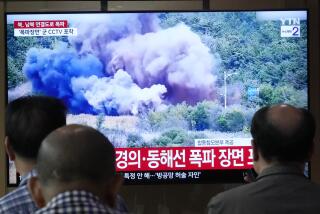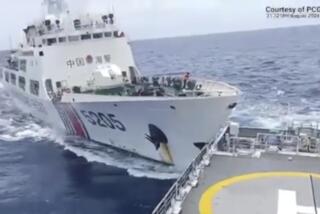S. Korea Sinks Northern Boat in Gun Battle
- Share via
SEOUL — One North Korean patrol boat was sunk and a second was reported sinking today after a gun battle between North and South Korean vessels in the Yellow Sea on the eighth day of a naval standoff over a crab fishing area claimed by both countries.
There was no immediate word on the fate of the North Korean crews, but seven South Korean sailors were slightly injured during the firefight, which damaged two South Korean vessels and a total of seven North Korean craft, South Korean defense officials said.
The incident, the latest in a series of recent naval clashes involving North Korean submarines and boats infiltrating South Korean and Japanese waters, is likely to increase criticism by South Korean hawks of President Kim Dae Jung’s “sunshine policy” of engagement toward the hungry and hermetic North.
The 10-minute firefight also threw into question the fate of a meeting between the two Koreas that is scheduled to be held in Beijing on Monday. In advance meetings, the two sides had reportedly agreed that South Korea would provide about 200,000 tons of fertilizer in exchange for the North allowing reunions among some of the estimated 1 million families that were separated by the 1945 division of the Korean peninsula.
Park Young Kyu, a researcher at the Korean Institute for National Unification in Seoul, the South Korean capital, predicted that the meeting will take place as planned.
“But because [at least] one boat was sunk today, they may demand to discuss this as the top agenda item,” Park said. “Then we’ll know that they have no real intention to carry through.”
According to South Korean defense officials, North Korean ships frequently try to penetrate South Korean waters during crab season, sometimes sending military vessels to accompany their fishing boats, but they usually retreat when the South Koreans order them to leave.
However, on June 8, North Korean vessels refused to leave the crabbing area, which is about 60 miles northwest of Seoul, and on Friday, a South Korean vessel rammed a North Korean ship during a face-off.
“Maybe North Korea has been a little bit shamed [by the ramming], so they would like to test the attitude of the South Korean navy,” said Lee Sohang, professor at the Institute for Foreign Affairs and National Security in Seoul.
“It’s just a confrontation on pride between the two sides,” Lee said.
While the demilitarized zone between the two nations does not extend into the sea, the United Nations declared a naval frontier in 1953 and a buffer zone to the south to deter naval conflicts.
The North Koreans have respected the line in the past, though they have never formally accepted it, South Korean diplomats said. But Pyongyang is now claiming that the line has no legal standing and the crabbing area belongs to the North since it is within its 12-mile territorial waters.
South Korean Brig.-Gen. Cha Young Koo said the naval firefight today broke out at 9:25 a.m. after North Korean vessels crossed the line and South Korean vessels tried to repulse them.
The North Koreans fired first with a 25-millimeter machine gun, and South Koreans returned fire with a 40-millimeter weapon, Cha said.
A total of seven North Korean vessels were damaged, including the patrol boat that sank, the second that was half underwater, a torpedo boat that was towed back into North Korean waters under South Korean fire, two boats that were burned and two other medium-sized vessels that were damaged, according to South Korean military officials.
A South Korean cruiser was hit in its engine room and was limping back to base while leaking, and a speed boat was also hit, said Hwang Dong Kyu, a spokesman for the South Korean Army chief of staff.
“This incident is an outright challenge to our government effort to maintain patience and not provoke armed conflict, despite the fact that the North started this infiltration,” the Ministry of Defense said today. “North Korea bears total responsibility for this incident.”
South Korean military forces were put on full alert, and President Kim convened a meeting of his national security council.
The gunfire began just 35 minutes before the North Koreans were to sit down for talks with the United Nations Command over the escalating tensions in the disputed waters. The talks were held as scheduled, with the U.N. officials urging both sides to back off, and stressing that the unofficial line has existed for decades. But the two sides were unable to agree on how to reduce tensions, the U.N. Command said in a statement.
Radio Pyongyang, in a broadcast monitored by KBS-TV in Seoul, declared, “The People’s navy, under the heroic leadership of Comrade Kim Jong Il, is destroying the South Korean navy in the Western Sea. This is the result of the more than 185 visits that our Dear Leader [Kim Jong Il] made to naval bases to instruct them.”
Last week, some analysts speculated that the North’s seemingly provocative stance had more to do with food than politics. The precious crabs, which can be harvested only for a few weeks in June, can fetch $17.60 apiece in Seoul markets and even more in Japan. The North Koreans, who can sell the crabs abroad for badly needed hard currency, said they were simply guarding their fishing vessels.
“Now it looks like part of a concerted diplomatic effort to break out of the bilaterals” scheduled in Beijing, said John Barry Kotch, adjunct professor at Hangyang University in Seoul. “It doesn’t make any sense. It’s irrational.”
The Joong-Ah Daily News reported in today’s editions that Pyongyang had rejected a confidential proposal brought to the North Korean leadership by former U.S. Defense Secretary William J.Perry, President Clinton’s envoy. Perry reportedly proposed improved relations with the United States, Japan and South Korea in exchange for the North refraining from pursuing its nuclear and missile programs.
The newspaper reported, without attribution, that Kim Young Nam, the North Korean official who met Perry, had also refused to convey a verbal message carried by Perry from South Korean President Kim to North Korean leader Kim Jong Il.
However, the report could not be immediately confirmed, and Park said he had not heard similar reports from South Korean government sources.
Chi Jung Nam of The Times’ Seoul Bureau contributed to this report.
More to Read
Sign up for Essential California
The most important California stories and recommendations in your inbox every morning.
You may occasionally receive promotional content from the Los Angeles Times.













